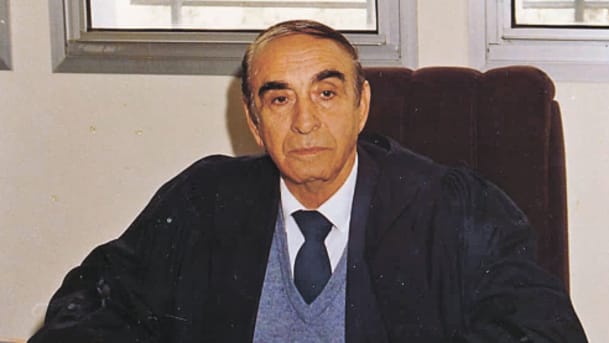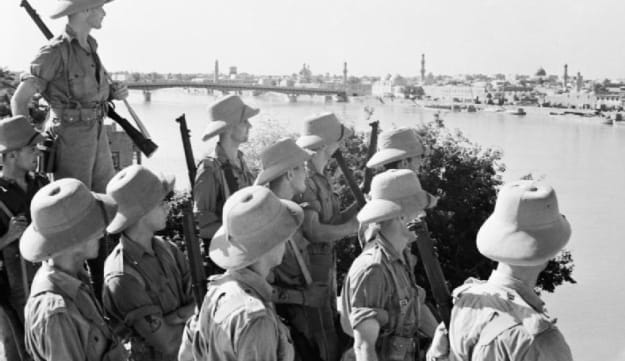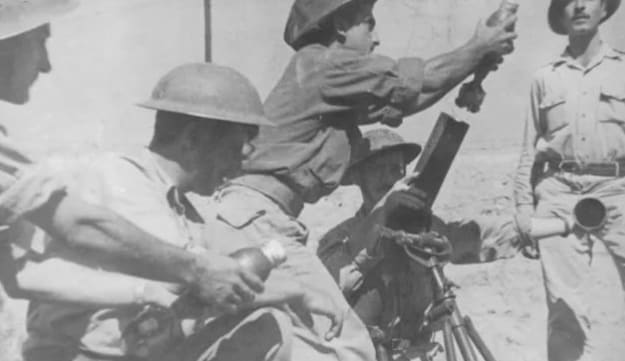The Jew Who Helped Defeat Iraq’s pro-Nazi Regime
by Ofer Aderet
Yoav Byron Kattan, who passed away last week, founded a Zionist underground in Iraq and served as a judge in Israel

Yoav Byron Kattan, a retired judge from Be’er Sheva who died last week, once recalled how “Nazi ideology was bubbling up” in his native Iraq during his formative years. Decades after immigrating to Israel, he could still recall the incitement broadcast on Radio Berlin in Arabic that blasted from radios in cafes in Baghdad and Basra. His father, an importer and exporter, told his Jewish friends to boycott Germany. In response, the German ambassador to Iraq, Fritz Grobba, “sent emissaries to father warning him to drop it,” Byron Kattan said at the time.
Born in Basra in 1923, he was 17 when he joined the British army in 1941. He served as a translator in the Royal Gurkha Rifles regiment. The regiment battled the Iraqi forces in the Anglo-Iraqi war, which broke out after the military coup that brought the pro-Nazi Rashid Ali al-Gaylani to power and resulted in Iraq’s reoccupation by the British. The regiment later took part in the liberation of Syria from Vichy rule.
But Byron Kattan was rankled by the hesitant British response to the Farhud, the pogrom immediately following their victory in June 1941, during which his father’s store was looted. He founded a Zionist underground movement, the Free Jewish Community, which he said had 300 members. They trained in self-defense and acquired weapons, learned Hebrew and supported illegal immigration to Palestine. He thus followed in the footsteps of his father, who had founded the Hebrew Scouts Movement in Iraq 20 years earlier.

When Zionist emissaries from Palestine came later to prepare Iraqi Jews for immigration, Byron Kattan began operating the local branches of the Hehalutz movement and Mossad Le’aliyah Bet that they set up. He stressed that his Zionist work preceded the arrival of the emissaries. “They didn’t bring Zionism to us, it was already around,” he said in an interview.
It was around this time that he adopted the nom de guerre Yoav, which later became his legal name – his given name was Frederick. He would also add Byron to his original family name, Kattan.
He entered the annals of history in 1946 when he testified before the Anglo-American Committee of Inquiry on Palestine, which set out to “examine political, economic and social conditions in Palestine as they bear up on the problem of Jewish immigration an settlement therein and the well-being of the peoples now living therein.” He stressed the importance of establishing a Jewish state. “I am the one of all Iraqi Jews who managed to steal away and meet the committee secretary and to send him a personal memo.” How did he do it? After reading a newspaper report about the arrival of the committee members, he went to their hotel and spent the afternoon waiting in the lobby, hoping they would come down for a cup of tea like other British people. “Suddenly, at 5 o’clock, the committee secretary appears. I draw near and whisper to him that I want to talk with him about the Jews,” he recalled. There is evidence of his testimony in the British archives that a Jew who refused to give his name gave the secretary a memo and quickly left.
He fled to Palestine via Lebanon in 1947 after the Iraqi authorities began looking for him. He lived in Kibbutz Ashdot Yaakov and was later one of the founders of Kibbutz Neve Ur. He was one of the first volunteers for the Golani Brigade during Israel’s War of Independence, participating in all its battles in the Galilee and the Negev, including stopping the Syrian advance. “There was only one artillery piece in Degania, which was being used against the Syrian army and broke down in the middle of the battle. Then I had a resourceful idea. I made a primitive setup on a plank,” he recalled. “I aimed the mortar and made a direct hit. It is one of the things that perhaps decided the battle’s fate.”

He went on to serve in the reserves during the Sinai Campaign, the Six-Day War and the War of Attrition.
He moved to Be’er Sheva in 1955. After serving in the standing army and completing his law degree at Tel Aviv University, he opened a law firm there. He served as legal adviser for the city and was appointed as a judge in 1971, retiring in 1987.
“He was always aware of the scales of justice,” his grandson Oz said. “As a judge, he was first of all a human being and afterward a legalist.”
Byron Kattan, a resident of the B’er Sheva suburb of Omer, was honored by the city of Be’er Sheva and received medals for fighting the Nazis, both from the British and from Israel. His wife, Aliza, also a member of the Zionist underground in Iraq, died in 2008. He is survived by four children, 14 grandchildren and 21 great-grandchildren.
[ Original here. ]
Category: Iraq, Israel, Personal History



